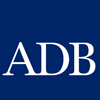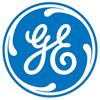See You at Methane Expo 2013!
Join the Global Methane Initiative (GMI) in Vancouver, Canada, from 12 to 15 March 2013.
Don't miss this opportunity to network and learn more about current global methane reduction efforts in Agriculture, Coal, Municipal Solid Waste (MSW), Oil and Gas, and Municipal Wastewater. Find up-to-date information about the Expo at the Methane Expo 2013 website, including:
- Supporter and exhibition opportunities, including
the opportunity to help offset the Expo's electricity use through
Cowpower

- Complete Expo program and agendas for each sector
- Expo venue and hotel reservation information
- Itineraries for the popular local site tours
Register now for Methane Expo 2013! Visit the Methane Expo registration page to ensure that you won't miss out on the world's largest forum for methane projects, technology, financing, and policy. Registration for site tours, visa information, and hotel reservations can also be found on the registration page.
The Center for Clean Air Policy (CCAP) is hosting a side event for MSW Expo participants
on the evening of 13 March to showcase its collaborative work with Environment Canada
regarding
nationally appropriate mitigation actions
 in waste management. Additional side events include the
Climate and Clean Air Coalition's (CCAC)
in waste management. Additional side events include the
Climate and Clean Air Coalition's (CCAC)
 MSW Working Group Meeting on Monday and Tuesday, CCAC's Oil and Gas Working Group
Meeting and the World Bank's Methane Finance Study Group Meeting on Tuesday.
MSW Working Group Meeting on Monday and Tuesday, CCAC's Oil and Gas Working Group
Meeting and the World Bank's Methane Finance Study Group Meeting on Tuesday.
Expo exhibitors currently include:

Visit the Expo website for more information.
GMI Welcomes Albania
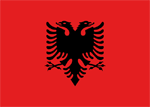 In
December 2012, GMI welcomed its newest Partner Country, Albania.
As part of its pending membership in the European Union, Albania has been seeking
out opportunities to address solid waste management and landfill issues and desires
to develop several landfill gas (LFG) energy projects to support its sustainability
efforts. They look forward to working with GMI Partner Countries in expanding their
expertise in solid waste management and landfill engineering and will participate
in GMI’s MSW Subcommittee. Albania’s membership in GMI brings total participation
to 41 countries and the European Commission.
In
December 2012, GMI welcomed its newest Partner Country, Albania.
As part of its pending membership in the European Union, Albania has been seeking
out opportunities to address solid waste management and landfill issues and desires
to develop several landfill gas (LFG) energy projects to support its sustainability
efforts. They look forward to working with GMI Partner Countries in expanding their
expertise in solid waste management and landfill engineering and will participate
in GMI’s MSW Subcommittee. Albania’s membership in GMI brings total participation
to 41 countries and the European Commission.
Spotlight: Encouraging Clean Energy from Wastewater Treatment Plants
Capturing and using methane from wastewater treatment facilities will be increasingly
important in the next 40 years as water usage grows to meet the demand of the world's
9 billion people.
U.S. EPA estimates
 that, globally, methane emissions from wastewater contributed an estimated 512 million
metric tons of carbon dioxide equivalent in 2010, accounting for approximately 7
percent of total global methane emissions.
that, globally, methane emissions from wastewater contributed an estimated 512 million
metric tons of carbon dioxide equivalent in 2010, accounting for approximately 7
percent of total global methane emissions.
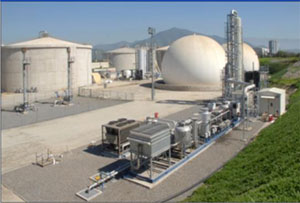 La Farfana wastewater treatment plant, Santiago, Chile.
La Farfana wastewater treatment plant, Santiago, Chile.
In 2011, GMI responded to this issue and formed the Municipal Wastewater Subcommittee to address the anticipated 19 percent growth in global methane emissions from the wastewater sector by 2030. U.S. EPA projected the most significant increases to come from Africa, the Middle East, Asia, and Central and South America. Most developed countries rely on centralized aerobic wastewater treatment systems to collect and treat municipal wastewater. These systems emit little methane themselves but produce large amounts of biosolids that can result in high rates of methane emissions. In developing countries with little or no collection and treatment of wastewater, systems that do exist (e.g., lagoons, septic systems, latrines) tend to be anaerobic, and thus, result in greater methane emissions. The subcommittee has already begun efforts to raise awareness, share management approaches, and develop sector- and country-based plans.
GMI plans to promote success stories like the La Farfana wastewater treatment plant in Santiago, Chile, where biogas produced helps meet local energy demand. In 2004, the region was experiencing a natural gas shortage, and Metrogas (a Chilean energy company) began discussions with Aguas Andinas about capturing the biogas produced in La Farfana's anaerobic digesters and converting it to town gas quality. After some trial and error, the project successfully converted La Farfana's biogas to town gas quality by removing the biogas's moisture, hydrogen sulfide, and carbon dioxide (CO2). Project officials faced a hurdle finding a suitable technology to remove the large amounts of hydrogen sulfide but found success with a "Paques" biological process. A key part of the project was getting the biogas from La Farfana to the town gas plant, which Metrogas accomplished by constructing a 13.7-kilometer pipeline. In 2008, the first gas was delivered. The investments from Metrogas and Aguas Andinas were rewarded with renewed company images for promoting technology and renewable energy.
This project created numerous environmental and economic benefits. First, the cleaned biogas was substituted for town gas, reducing fossil fuel use and greenhouse gas emissions. The La Farfana project is expected to reduce 26,000 metric tons of CO2 equivalent annually and was registered as a Clean Development Mechanism in 2011. The project also created local construction jobs during the installation of the pipeline, as well as technical jobs on-site at the plant. Additionally, the project increases the region's energy independence, creates a local renewable energy source, and transforms waste into a revenue source. It also serves as a site for educational tours.
Subcommittee Updates
Agriculture
During the 28 November Internet meeting, the Agriculture Subcommittee discussed the development of case studies to be included in an International Best Practices Guide for Agricultural Anaerobic Digestion Projects. The case studies will be compiled and shared at the Methane Expo 2013. Meeting participants also discussed the upcoming Expo, during which the next subcommittee meeting will be held on 13 March 2013. During the Expo, attendees can visit Bakerview EcoDairy, the first small-scale anaerobic demonstration farm of its kind in Canada.
Coal
The Coal Subcommittee released its draft agenda (PDF, 18 pp, 125 KB) for the coal technical and policy sessions to be held during Methane Expo 2013. Along with the extensive and informative technical and policy sessions, the Coal Subcommittee will hold its 17th session during the Expo on 13 March. The subcommittee agenda will cover policy updates from China, India, and the United States, as well as important subcommittee business. Minutes from the September meeting in Sydney are available on the website.
Municipal Solid Waste
On 19 November, the MSW Subcommittee conducted its 17th meeting via the Internet. Twenty-eight Delegates and Project Network members participated in the MSW Subcommittee meeting, representing Partner Countries Canada, Colombia, Germany, Ghana, India, Pakistan, Poland, Serbia, Ukraine, and the United States. The meeting focused on an update from the ASG, a survey distributed to delegates to help focus future initiatives, country methane action plans, and preparation for Methane Expo 2013. The subcommittee has planned two MSW site visits for the Expo, including a visit to the City of Vancouver Landfill and a trip to Vancouver Island to see the Nanaimo Bioenergy Centre LFG energy project and the ICC and Compost R&D Facility.
Municipal Wastewater
Annacis Island Wastewater Treatment Plant
As part of the Expo festivities, Vancouver is excited to show off the co-digestion
system at its largest wastewater treatment plant. Don't miss this opportunity to
see how the city is working toward becoming carbon neutral with this innovative
project.
On 6 December, the Municipal Wastewater Subcommittee met via the Internet. The meeting, for which minutes are posted, primarily focused on preparations for Methane Expo 2013, including a discussion of topics and speakers for the technical and policy sessions (PDF, 18 pp, 125 KB) and to solicit additional projects for the poster exhibit. The subcommittee is writing a sector fact sheet to be shared at the next subcommittee meeting, which is scheduled for 13 March 2013 during the Expo. Other topics for the next meeting are the development of country-specific action plans and the value of developing country resource assessments. The ASG also encourages delegates to be prepared with short remarks about the latest policy and project developments in their countries.
Oil and Gas
The Subcommittee Co-Chairs collaborated with the ASG to draft the agenda (PDF, 18 pp, 125 KB) for the Subcommittee meeting and technical and policy sessions to be held during the Expo. The Oil and Natural Gas track will include presentations on novel approaches to methane emissions detection and measurement, corporate experience in addressing methane emissions, best practices for capturing and utilizing gas streams, and methodologies for quantifying and reducing vented and flared associated gas. We anticipate presentations from experts representing China, Colombia, India, Indonesia, Mexico, Russia, and Ukraine.
The Subcommittee meeting will cover goals and possible next steps, areas for Subcommittee engagement, and updates on sector-specific activities within each country in support of the GMI strategic goals and charge to the Subcommittee. On 12 March 2013, the Subcommittee has scheduled a site visit to Fortis's liquefied natural gas facility in British Columbia.
Non-Point Source Pollution Control Could Reduce Methane Emissions
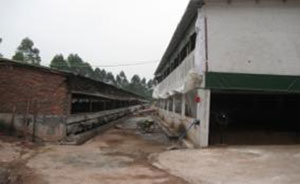 Comparative flush building (on the left) and the pilot hi-rise building (on the
right).
Comparative flush building (on the left) and the pilot hi-rise building (on the
right).
A team of experts from the World Bank
 ,
the United Nations Food and Agriculture Organization
(FAO)
,
the United Nations Food and Agriculture Organization
(FAO)
 ,
and U.S. EPA in support of GMI were in Guangdong Province, China,
as part of the preparation for a provincial scale non-point source pollution prevention
program focused on livestock waste, fertilizers, and pesticides. A key technical
component for livestock waste is the development of treatment processes where anaerobic
waste stabilization is the first step in the treatment of pig wastes. A pilot hi-rise
swine building (see photo), which is operating well after 50 days, shows promise
for replication in the Chinese pork industry.
,
and U.S. EPA in support of GMI were in Guangdong Province, China,
as part of the preparation for a provincial scale non-point source pollution prevention
program focused on livestock waste, fertilizers, and pesticides. A key technical
component for livestock waste is the development of treatment processes where anaerobic
waste stabilization is the first step in the treatment of pig wastes. A pilot hi-rise
swine building (see photo), which is operating well after 50 days, shows promise
for replication in the Chinese pork industry.
In a hi-rise swine building, a slatted floor is installed on the second floor of the structure where pigs are raised. This allows manure and urine to pass through to the ground floor, where sawdust bedding absorbs the organic material. This initiates an aerobic composting process. This manure management method could replace typical flush manure buildings and liquid manure storage, thereby also reducing methane emissions. If hi-rise housing proves successful, this new practice would play a large role replacing single-floor flush farm production practices, which would significantly improve the environmental conditions of pig farms and the surrounding area from reduced point and non-point source pollution, as well as reduce methane emissions.
GMI Outreach
Asia
October 2012, Indonesia. Indonesia hosted the
7th Asian-Pacific Landfill Symposium
 ,
which included a presentation on GMI's work in reducing greenhouse gas emissions
in the region. The Indonesian Ministry of Public Works met with U.S. EPA staff to
discuss further collaboration, such as the technical training and project development
assistance that GMI offers.
,
which included a presentation on GMI's work in reducing greenhouse gas emissions
in the region. The Indonesian Ministry of Public Works met with U.S. EPA staff to
discuss further collaboration, such as the technical training and project development
assistance that GMI offers.
China Energy Markets Report Released
U.S. EPA posted the recently released China's Energy Markets: Anhui, Chongqing,
Henan, Inner Mongolia, and Guizhou Provinces on its
Coalbed Methane Outreach Program China International Activities webpage
 .
The document, designed for use by project developers and carbon finance groups,
is intended to aid in the establishment of CMM emission reduction projects.
.
The document, designed for use by project developers and carbon finance groups,
is intended to aid in the establishment of CMM emission reduction projects.
November 2012, China. China's Wuhan Urban Administration Supervising Bureau worked with U.S. EPA's MSW staff to collect data on the Changshankou, Beiyangqiao, and Chenjiachong landfills. The data will be used to evaluate the potential for LFG energy recovery projects at the sites.
December 2012, Turkey. Representatives from universities and energy companies in Istanbul met with U.S. EPA MSW staff to discuss the collection efficiency performance of biogas projects and to prioritize the next set of landfills to assess for LFG energy potential. Site visits to two active LFG projects in Istanbul, and a pilot MSW anaerobic digester plant co-located at the Kocaeli landfill, were also completed.
December 2012, Russia. Gazprom, a global energy company, hosted a conference—Prospects of Low-Carbon and Renewable Sources of Energy Development—during which U.S. EPA oil and gas sector staff, in support of GMI, presented on the economic, operational safety, and environmental benefits that accrue from efforts to manage and minimize methane emissions. Russian state officials also met with U.S. EPA to discuss collaboration with GMI and to encourage closer cooperation with Russian stakeholders.
Europe
September 2012, Serbia and Bosnia. The Ministry of Environment, Natural Resources and Spatial Planning met with U.S. EPA MSW staff, who had traveled to Belgrade to conduct pre-feasibility studies at area landfills. The Ministry and U.S. EPA, in support of GMI, worked on development of the Serbia Methane Action Plan and selected project sites to be featured at the Expo. The team then traveled to Sarajevo, Bosnia and Herzegovina, to tour the Sarajevo Landfill and evaluate its LFG recovery project.
September 2012, Italy. U.S. EPA MSW staff, in support of GMI, presented
on the release of the International
Best Practices Guide for Landfill Gas Energy at the
International Solid Waste Association (ISWA) 2012 World Congress
 .
Affiliates from Serbia, Turkey, and United States, as well as representatives of
ISWA, met to discuss future collaborative efforts, such as an LFG workshop at the
next ISWA Beacon Conference.
.
Affiliates from Serbia, Turkey, and United States, as well as representatives of
ISWA, met to discuss future collaborative efforts, such as an LFG workshop at the
next ISWA Beacon Conference.
October 2012, England. At the World Bank's
Global Gas Flaring Reduction Partnership
 conference, U.S. EPA oil and gas staff, in support of GMI, presented on quantifying
and reporting flaring and venting emissions. They also met with the
Carbon Disclosure Project
conference, U.S. EPA oil and gas staff, in support of GMI, presented on quantifying
and reporting flaring and venting emissions. They also met with the
Carbon Disclosure Project
 to provide guidance on reporting methane emissions.
to provide guidance on reporting methane emissions.
Central America/South America
August 2012, Argentina. Representatives from the Neuquén LFG engine demonstration project, a grant funded by the U.S. EPA in support of GMI met with U.S. EPA MSW to discuss the project. The team also assessed progress with an upcoming request for proposals for an LFG project at the Bahía Blanca Landfill.
August 2012, Chile. The Subsecretaría de Desarrollo Regional y Administrativo (SUBDERE) and U.S. EPA MSW staff trained over 100 participants on LFG technologies, the fundamentals of LFG collection and control systems, and best practices for LFG recovery at a meeting in Concepción. Staff also visited the municipality of La Pintana to evaluate their current household organic waste diversion program.
September 2012, Brazil. Representatives of various public and private
organizational stakeholders, including the
National Bank of Economic and Social Development (BNDES)
 ,
the Environmental Secretary of the State of São Paulo, and U.S. EPA MSW sector
staff, met to discuss current methane capture initiatives. BNDES explained its process
for financing GHG mitigation projects at a low interest rate. Staff also met with
Companhia Municipal de Limpeza Urbana (COMLURB) to collect data and analyze LFG
project opportunities at the Gericinó landfill in Rio de Janeiro.
,
the Environmental Secretary of the State of São Paulo, and U.S. EPA MSW sector
staff, met to discuss current methane capture initiatives. BNDES explained its process
for financing GHG mitigation projects at a low interest rate. Staff also met with
Companhia Municipal de Limpeza Urbana (COMLURB) to collect data and analyze LFG
project opportunities at the Gericinó landfill in Rio de Janeiro.
September 2012, Peru.
Fondo Nacional del Ambiente (FONAM)
 ,
with technical support from U.S. EPA, organized the workshop "Integrated Solid
Waste Management: Methane Capture and Use for Climate Change Mitigation" to
build awareness and technical capacity among regional government officials.
,
with technical support from U.S. EPA, organized the workshop "Integrated Solid
Waste Management: Methane Capture and Use for Climate Change Mitigation" to
build awareness and technical capacity among regional government officials.
September–October 2012, Dominican Republic. A
two-day workshop focusing on LFG energy technologies, LFG control systems,
and landfill operations and maintenance, was held to train 45 participants. The
National
Council for Climate Change and the Clean Development Mechanism
 and the Ministry of Environment met with U.S. EPA MSW sector staff to discuss collaboration
in MSW sector initiatives, such as the promotion of regional landfills by the Inter-American
Development Bank and a Zero-Waste Project in La Placeta.
and the Ministry of Environment met with U.S. EPA MSW sector staff to discuss collaboration
in MSW sector initiatives, such as the promotion of regional landfills by the Inter-American
Development Bank and a Zero-Waste Project in La Placeta.
November 2012, Colombia. The Ministry of Energy and Mines and GMI organized a workshop on "Benefits of Reducing Methane Emissions in the Oil and Gas Sector: The Global Methane Initiative in Colombia." Presentations included an overview of methane emissions from the Colombian oil and gas sector, a Chilean company's experience using infrared technology, the Colombian state-owned oil and gas company's collaboration with GMI, and the largest Colombian gas transmission company's efforts to conduct methane emission measurements.
North America
November 2012, United States. The Canadian Embassy hosted an event in Washington, DC, highlighting the Expo and GMI's work, as well as methane abatement and recovery and use initiatives in Canada. The event drew participants from Partner embassies and Project Network members in the area. Gina McCarthy, GMI Steering Chair and Stephen de Boer, Environment Canada, made opening remarks that set the stage for a successful event. A short presentation was given, after which a reception was held to allow participants to network with one another and learn more about methane recovery and use projects and programs.
Project Updates and Recent Developments
BECC Receives Grants for Training in Mexico
Mexico's Border Environment Corporation Commission
(BECC)
 has received two U.S. EPA grants in support of GMI, to build capacity for LFG energy
in the country. By working together, BECC and U.S. EPA have established a system
of support for municipalities along the U.S.-Mexico border that are interested in
pursuing LFG projects. With the first grant, issued in 2007, BECC conducted two
pre-feasibility studies to analyze the economic and technical feasibility of LFG
projects for landfills in
Saltillo, Coahuila state, and
Nogales, Sonoma state. EPA also hosted a training workshop for municipalities
in Mexico interested in learning the basics of LFG, during which they also outlined
the results of the two pre-feasibility studies. With the second EPA grant, issued
in 2009, BECC and the International City/County
Management Association
has received two U.S. EPA grants in support of GMI, to build capacity for LFG energy
in the country. By working together, BECC and U.S. EPA have established a system
of support for municipalities along the U.S.-Mexico border that are interested in
pursuing LFG projects. With the first grant, issued in 2007, BECC conducted two
pre-feasibility studies to analyze the economic and technical feasibility of LFG
projects for landfills in
Saltillo, Coahuila state, and
Nogales, Sonoma state. EPA also hosted a training workshop for municipalities
in Mexico interested in learning the basics of LFG, during which they also outlined
the results of the two pre-feasibility studies. With the second EPA grant, issued
in 2009, BECC and the International City/County
Management Association
 compiled a
manual (PDF, 79 pp, 2.38 MB, in Spanish)
compiled a
manual (PDF, 79 pp, 2.38 MB, in Spanish)
 for Mexican municipalities to address knowledge gaps and provide tools to assist
in the development and implementation of LFG projects.
for Mexican municipalities to address knowledge gaps and provide tools to assist
in the development and implementation of LFG projects.
Mexico City Awards Contract to Build LFG Project
The Ministry of Works and Services in Mexico City has taken the next step in its efforts to construct an LFG project at the Bordo Poniente landfill. A contract to construct and maintain the landfill, which was closed in December 2011, was recently awarded to BMLMX Power Company. Once completed, it will encompass the more than 370 hectares of landfill at Bordo Poniente and prevent 1.8 million tons of CO2 from entering the atmosphere each year for the 25-year lifespan of the project. GMI has been closely involved with the initiative, including conducting an evaluation of the potential of an LFG project at the landfill and providing assistance to the city in developing an RFP.
Vietnam Hosts Coal Meetings, Site Visits, and Workshop
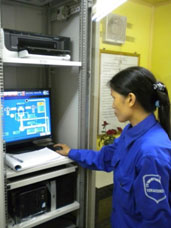 A Vinacomin technician operates a methane monitoring system at the Khe Cham mine.
A Vinacomin technician operates a methane monitoring system at the Khe Cham mine.
In late September 2012, U.S. EPA coal sector staff traveled to Vietnam to meet with
officials from the U.S. Embassy in Hanoi and the state-owned Vietnam National Coal
and Mineral Industries Group (Vinacomin
 ),
Institute of Mining Science and Technology (IMSAT). Vinacomin is the parent company
of approximately 30 coal companies, operating in both opencast and underground mines.
The meetings with IMSAT included discussions about the need for capacity building
in Vietnam's mining sector, the introduction of best practices for gas management,
and technical assistance in assessing the potential development of coal mine methane
(CMM) and ventilation air methane projects at gassy coal mines.
),
Institute of Mining Science and Technology (IMSAT). Vinacomin is the parent company
of approximately 30 coal companies, operating in both opencast and underground mines.
The meetings with IMSAT included discussions about the need for capacity building
in Vietnam's mining sector, the introduction of best practices for gas management,
and technical assistance in assessing the potential development of coal mine methane
(CMM) and ventilation air methane projects at gassy coal mines.
EPA participated in an IMSAT workshop titled "Improvement of Safety and Effectiveness for Coal Mine Gas Management in Underground Coal Mines." The workshop was well-attended by industry, and U.S. EPA staff presented on CMM project opportunities, as well as the feasibility of gas recovery and utilization at Cham Coal Mining Complex. In addition, staff toured two potential CMM project sites: 1) Khe Cham Mine, which has a gas drainage station; and 2) Mao Khe Mine, for which a methane drainage program is planned and awaiting approval.
In the future, GMI may hold a workshop in Vietnam on policy and financial issues with CMM recovery at Vinacomin mines, best practices for methane drainage and use, methane end-use options, and case studies of successful CMM projects.
New Law Requires Purchase of LFG in Brazil
In November 2012, the state government of Rio de Janeiro launched a new policy requiring state gas utilities CEG and CEG Rio to purchase biogas generated by landfills. The utilities are required to buy LFG, up to 5 percent of the total volume of natural gas distributed. The goal of the legislation is to ensure demand for the renewable LFG and stimulate investment in biogas plants at landfills. According to Legislative Council Secretary Julio Bueno, "the idea is to increase the share of biogas in the energy matrix of the State of Rio de Janeiro."
Source: Government of Rio de Janeiro,
Economic Development News
 ,
"State Government Launches State Politics Renewable Natural Gas," 28 November
28 (Portuguese).
,
"State Government Launches State Politics Renewable Natural Gas," 28 November
28 (Portuguese).

